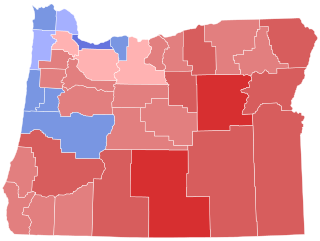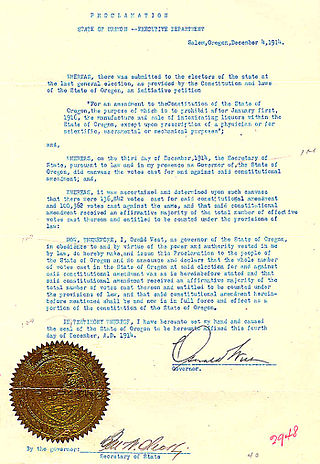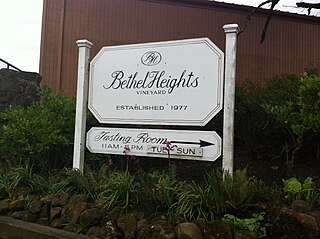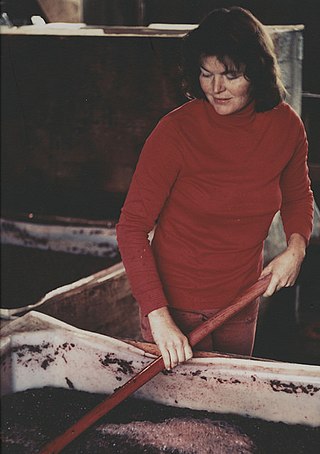Related Research Articles

Theodore Ralph Kulongoski is an American politician, judge, and lawyer who served as the 36th Governor of Oregon from 2003 to 2011. A member of the Democratic Party, he served in both houses of the Oregon Legislative Assembly and also served as the state Insurance Commissioner. He was the Attorney General of Oregon from 1993 to 1997 and a justice of the Oregon Supreme Court from 1997 to 2001. Kulongoski has served in all three branches of the Oregon state government.
The Oregon State Board of Higher Education was the statutory governing board for the Oregon University System from 1909 to 2015. The board was composed of eleven members appointed by the Governor of Oregon and confirmed by the Oregon State Senate. Nine members were appointed for four year terms; two members were students and appointed for two year terms.

The Oregon Bottle Bill is a container-deposit legislation enacted in the U.S. state of Oregon in 1971 that went into effect in October 1972. It was the first such legislation in the United States. It was amended in 2007 and 2011. It requires applicable beverages in applicable sizes in glass, plastic or metal cans or bottles sold in Oregon to be returnable with a minimum refund value. The refund value was initially 5 cents until April 1, 2017, when it increased to 10 cents. The Oregon Legislature has given the Oregon Liquor Control Commission the authority to administer and enforce the Bottle Bill. Oregon Beverage Recycling Cooperative (OBRC), a private cooperative owned by retailers and beverage distributors, administers the collection and transportation of returned containers and keeps all the unclaimed deposits. Materials from returned containers are sold by the OBRC and proceeds are handed out to beverage distributors. In 2022, the bottle bill was expanded to include canned wine, which will become eligible for redemption on July 1, 2025.

The Oregon Liquor and Cannabis Commission (OLCC), formerly known as the Oregon Liquor Control Commission, is a government agency of the U.S. state of Oregon. The OLCC was created by an act of the Oregon Legislative Assembly in 1933, days after the repeal of prohibition, as a means of providing control over the distribution, sales and consumption of alcoholic beverages. To this end, the agency was given the authority to regulate and license those who manufacture, sell or serve alcohol. Oregon is one of 18 alcoholic beverage control states that directly control the sales of alcoholic beverages in the United States. In 2014, the passage of Oregon Ballot Measure 91 (2014) legalized the recreational use of marijuana in Oregon and gave regulatory authority to the OLCC.

The 2006 Oregon gubernatorial election took place on November 7, 2006. Incumbent Democratic Governor of Oregon Ted Kulongoski ran for a second and final term as governor. Kulongoski faced several challengers in his primary, whom he dispatched to win his party's nomination a second time, while Republican nominee Ron Saxton, the former Chair of the Portland Public Schools Board and a candidate for governor in 2002 emerged from a crowded primary. Kulongoski and Saxton were initially going to be challenged in the general election by State Senator Ben Westlund, but Westlund withdrew his candidacy before the general election. There were multiple independent and third party challengers on the ballot as well. In a hard-fought campaign, Kulongoski won re-election by a surprisingly wide margin, winning his second term as governor.
Cooper Mountain Vineyards is an American winery located in Beaverton, Oregon, United States. Started in 1978, the certified organic wine maker produces Pinot noir, Pinot gris, Chardonnay, and Pinot blanc. Located in the Portland metropolitan area, the vineyard is sited on the western slopes of Cooper Mountain, an extinct volcano.
The state of Oregon in the United States has established an international reputation for its production of wine, ranking fourth in the country behind California, Washington, and New York. Oregon has several different growing regions within the state's borders that are well-suited to the cultivation of grapes; additional regions straddle the border between Oregon and the states of Washington and Idaho. Wine making dates back to pioneer times in the 1840s, with commercial production beginning in the 1960s.
The history of Oregon wine production stretches back to before the state was incorporated. Settlers to the Oregon Territory planted grapes as early as the 1840s, however the production of wine has only been a significant industry in Oregon since the 1960s. Oregon wines first achieved significant critical notice in the late 1970s; in 2005, the industry sold 1.6 million cases of Oregon vintages with a retail value of US$184.7 million. In 2015, there were 702 wineries and 28,034 acres of vitis vinifera planted.

The Willamette Valley AVA is an American Viticultural Area which lies in the Willamette Valley of Oregon. The AVA is the wine growing region which encompasses the drainage basin of the Willamette River. It stretches from the Columbia River in the north to just south of Eugene in the south, where the Willamette Valley ends; and from the Oregon Coast Range in the west to the Cascade Mountains in the east. At 5,360 square miles (13,900 km2), it is the largest AVA in the state, and contains most of the state's wineries; approximately 908 as of 2021.

Willamette Valley Vineyards is an American winery located in Turner, Oregon. Named after Oregon's Willamette Valley, the winery is the leading producer of Willamette Valley-appellated Pinot Noir in Oregon, and also produces Chardonnay and Pinot Gris. In 2016, the winery was the largest producer of Riesling wine in the Willamette Valley.
The State Accident Insurance Fund Corporation (SAIF) is a not-for-profit, state-chartered workers’ compensation insurance company in the U.S. state of Oregon. It provides workers' compensation insurance and workplace safety services for Oregon employers, and claim management for injured workers. It is based in Salem, Oregon.

The Eola-Amity Hills AVA is an American Viticultural Area located in Polk County and Yamhill County, Oregon. It is entirely contained within the Willamette Valley AVA, and stretches from the city of Amity in the north to Salem in the south. The Eola and Amity hills cover an area west of the Willamette River approximately 15 miles (24 km) long by 6 miles (10 km) wide. The Eola-Amity Hills area benefits from steady winds off the Pacific Ocean that reach the Willamette Valley through the Van Duzer Corridor, a gap in the Oregon Coast Range, moderating the summer temperatures. The Eola Hills were named after the community of Eola, whose name was derived from Aeolus, the Greek god of the winds.

The 2002 Oregon gubernatorial election took place on November 5, 2002. Incumbent Democratic Governor of Oregon John Kitzhaber was unable to seek a third consecutive term as governor, therefore creating an open seat. To replace him, former Oregon Supreme Court Associate Justice Ted Kulongoski won a crowded and competitive Democratic primary, while former State Representative Kevin Mannix emerged from an equally competitive Republican primary. The campaign between Kulongoski and Mannix, who were joined by Libertarian nominee Tom Cox, was close and went down to the wire. Ultimately, Kulongoski eked out a narrow margin of victory over Mannix, which was slightly smaller than Cox's total vote share, allowing Kulongoski to win what would be the first of two terms as governor. As of 2023, this is the last time that Oregon voted for a gubernatorial nominee and a U.S. Senate nominee of different political parties.

The 75th Oregon Legislative Assembly convened beginning on January 12, 2009, for its biennial regular session. All of the 60 seats in the House of Representatives and half of the 30 seats in the State Senate were up for election in 2008; the general election for those seats took place on November 4.

The U.S. state of Oregon has an extensive history of laws regulating the sale and consumption of alcoholic beverages, dating back to 1844. It has been an alcoholic beverage control state, with the Oregon Liquor and Cannabis Commission holding a monopoly over the sale of all distilled beverages, since Prohibition. Today, there are thriving industries producing beer, wine, and liquor in the state. Alcohol may be purchased between 7 a.m. and 2:30 a.m for consumption at the premise it was sold at, or between 6 a.m. and 2:30 a.m. if it is bought and taken off premise. In 2020, Oregon began allowing the sale of alcohol via home delivery services. As of 2007, consumption of spirits was on the rise while beer consumption held steady. That same year, 11% of beer sold in Oregon was brewed in-state, the highest figure in the United States.

Cristom Vineyards is an Oregon wine producer and vineyard based near Salem, U.S. It is in the Eola-Amity Hills wine region within the Willamette Valley AVA, about 6 miles (9.7 km) northwest of Keizer.

Bethel Heights Vineyard is an Oregon winery in the Eola-Amity Hills AVA of the Willamette Valley. Founded in 1977 by twin brothers Ted and Terry Casteel, their wives Pat Dudley and Marilyn Webb, and Pat's sister Barbara Dudley, the vineyard was one of the earliest plantings in the Eola-Amity Hills region. A winery soon followed, with the first estate wines produced in 1984. Bethel Heights specializes in Pinot noir, offering several individual block and vineyard designated bottlings, but also produces wines made from Chardonnay, Pinot gris, Pinot blanc, Riesling, Grüner Veltliner, and Gewürztraminer.

Sokol Blosser Winery is a vineyard, tasting room and winery facility located northeast of Dayton, Oregon in the Red Hills of Dundee in Yamhill County. It was founded by Bill Blosser and Susan Sokol Blosser in 1971 in what is now known as the Dundee Hills AVA. Sokol Blosser Winery is family owned and operated by second-generation co-presidents, siblings Alex and Alison Sokol Blosser, and is the 6th largest wine producer in Oregon. Sokol Blosser is considered to be “synonymous with sustainability,” and produces Pinot Noir, Pinot Gris, Chardonnay, proprietary blends Evolution White and Evolution Red, a range of other Evolution wines, and small quantities of single block Pinot Noirs, Rosé of Pinot Noir, White Riesling dessert wine, and sparkling wine.

Dick Ponzi is an American winemaker, a pioneer of the Oregon wine industry and the Oregon brewing industry, and the founder of Ponzi Vineyards, one of the Willamette Valley's founding wineries. He also had a successful career as a structural engineer. Ponzi is regarded as an enological and viticultural innovator. He was a founding member and the first president of the Oregon Winegrowers Association and a founding director of the Oregon Wine Board. He and his wife also established Oregon's first craft brewery, Bridgeport Brewing Company.

Nancy Ponzi is a pioneer of the Oregon wine industry and the Oregon brewing industry, and the founder of Ponzi Vineyards, one of the Willamette Valley's founding wineries. She and her husband Dick Ponzi also established Oregon's first craft brewery, Bridgeport Brewing Company.
References
- 1 2 3 "Governor Ted Kulongoski Appoints Members of New Oregon Wine Board" (Press release). Salem, Oregon: Office of the Governor of Oregon. November 5, 2003. Retrieved 2006-12-25.
- 1 2 3 Danehower, Cole (September 29, 2003). "Cole Danehower on Oregon Wine: Oregon Wine Board Holds Promise for a New Era of Oregon Wine Marketing". Avalon Wine (Online). Corvallis, Oregon: Avalon Wine. Archived from the original on 2006-10-24. Retrieved 2006-12-25.
- ↑ "OLCC Doles Out $8.5 Million". Portland Business Journal (Online). Portland, Oregon: American City Business Journals. May 5, 2005. Retrieved 2006-12-25.
- ↑ "Oregon Wine Board Tax Report" (PDF). Salem, Oregon: Oregon Liquor Control Commission. December 1, 2004. Archived from the original (PDF) on 2006-09-23. Retrieved 2006-12-25.
- ↑ Associated Press (AP) (March 19, 2004). "New Oregon wine board to pick director". Wine Press Northwest (Online). Kennewick, Washington: Wine Press Northwest. Archived from the original on December 5, 2004. Retrieved 2006-12-25.